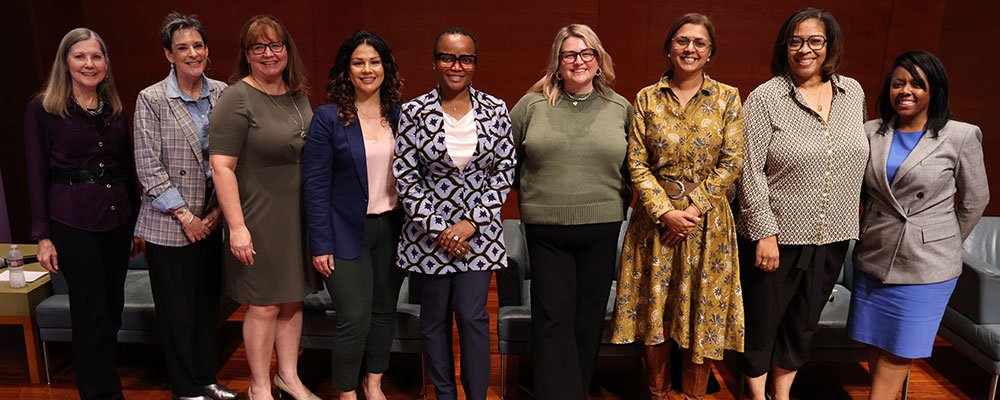Women in Leadership Seminar highlights individual paths to success

Five distinguished speakers shared their unique journeys and insights into leadership, mentorship, and self-care at the Women in Leadership Seminar series on Thursday, March 21, at the Beth Robertson Auditorium in the Fayez S. and Susan K. Sarofim Research Building.
Each speaker offered their perspective and highlighted the importance of resilience, mentorship, and fostering a supportive environment within their respective fields.
Panelists included:
- Elaheh Ashtari, PsyD, associate professor in the Louis A. Faillace, MD, Department of Psychiatry and Behavioral Sciences and director of psychology services at UTHealth Houston Behavioral Sciences Campus
- Dana McDowelle, MS, PhD, associate dean for admissions and student affairs
- Omonele Nwokolo, MD, professor in the Department of Anesthesiology, Critical Care and Pain Medicine ; assistant OR director at Harris Health Lyndon B. Johnson Hospital; and OR director at Memorial Hermann-Texas Medical Center
- Sarah Peirce, director of management operations IV for the Department of Internal Medicine
- Shreela Sharma, PhD, RD, professor and vice chair of the Department of Epidemiology and director of the Center for Health Equity at UTHealth Houston School of Public Health
- The discussion was moderated by Deana Moylan, associate vice president of University Relations and Equal Opportunity at UTHealth Houston.
Ashtari discussed the importance of influencing change and fostering collaboration. She highlighted the significance of listening and joining forces with stakeholders to effectively celebrate achievements and address challenges.
“There’s a lot of different events at the behavioral sciences campus that we like to celebrate. It means coming together, understanding each other’s perspectives from the different disciplines, communicating the need, and listening to the need,” Ashtari said. “Listening is a huge leadership skill that we all need to consistently develop. I would also say collaboration has been the key to effectively celebrating various disciplines and services.”
McDowelle said getting to know employees goes a long way toward having a healthy work environment.
“You’ve got to connect with your people. I encourage everybody to make a concerted effort to know each other as people first, and team members second,” McDowelle said. “I say all the time, while I do enjoy my job, if there were no paycheck, I’m not sure I’d show up every day. I tell my staff, ‘I know that you have other things going on.’ Understand what’s going on for them and be supportive and flexible with that information to help them, so that when they’re at work, they can focus and feel cared about beyond just being an employee of the team. That helps all of us say, ‘Hey, I need to take care of myself.’”
Nwokolo reflected on her journey from medicine to leadership. She credits her transition to leadership to a supportive mentor who recognized her potential and encouraged her to step into new roles.
“My journey into medicine was because somebody told me I couldn’t. I set out to prove them wrong, and I became a physician,” Nwokolo said. “My journey to anesthesia was because I love anesthesia. When I started my clinical practice, I had someone who saw potential leadership in me. They pushed me into leadership and said, ‘You know, you’re going to do this.’ I started, I enjoyed it, and I’ve continued on that path.”
Peirce shared how she came into her role as a director of management operations, and found fulfillment and growth through mentorship and building a strong team. She said trusting and empowering her team members is important.
“I have a phenomenal team that I have worked with for a long time. I’ve given them the trust and opportunity to go lead on their own,” Peirce said. “It’s the only way that I survive. I try to tell them that all the time. It’s exciting to watch them as they continue to grow and branch out.”
Sharma, known for her work in health equity and food insecurity, discussed the importance of mentorship, paying it forward, and always putting students first.
“My job is to invest in them,” Sharma said. “If you ask me what keeps me going, it’s my students doing better than I am, that’s my measure of success. It’s not how many accolades I receive — it’s how are they shining. That’s the ethos that I follow, and then I encourage them to pay it forward. The No. 1 job in leadership is to mentor. There’s nothing more important than that. Being transparent, honest, and vulnerable — I think all of those go together if you want to have an engaged student body.”
The Women in Leadership Seminar, which just completed its eighth year, is sponsored by university administration through Human Resources Organizational and Talent Development in collaboration with the Office of Faculty Affairs and Development.
The seminar series creates an environment for employees to learn about the experiences, challenges, and achievements of women in leadership. Open to all UTHealth Houston faculty, staff, and students of any gender, the series gives participants an opportunity to gain leadership insights and techniques while also connecting with colleagues from across the institution.
For additional information, visit go.uth.edu/wils. Questions can be directed to [email protected] or 713-500-3169.